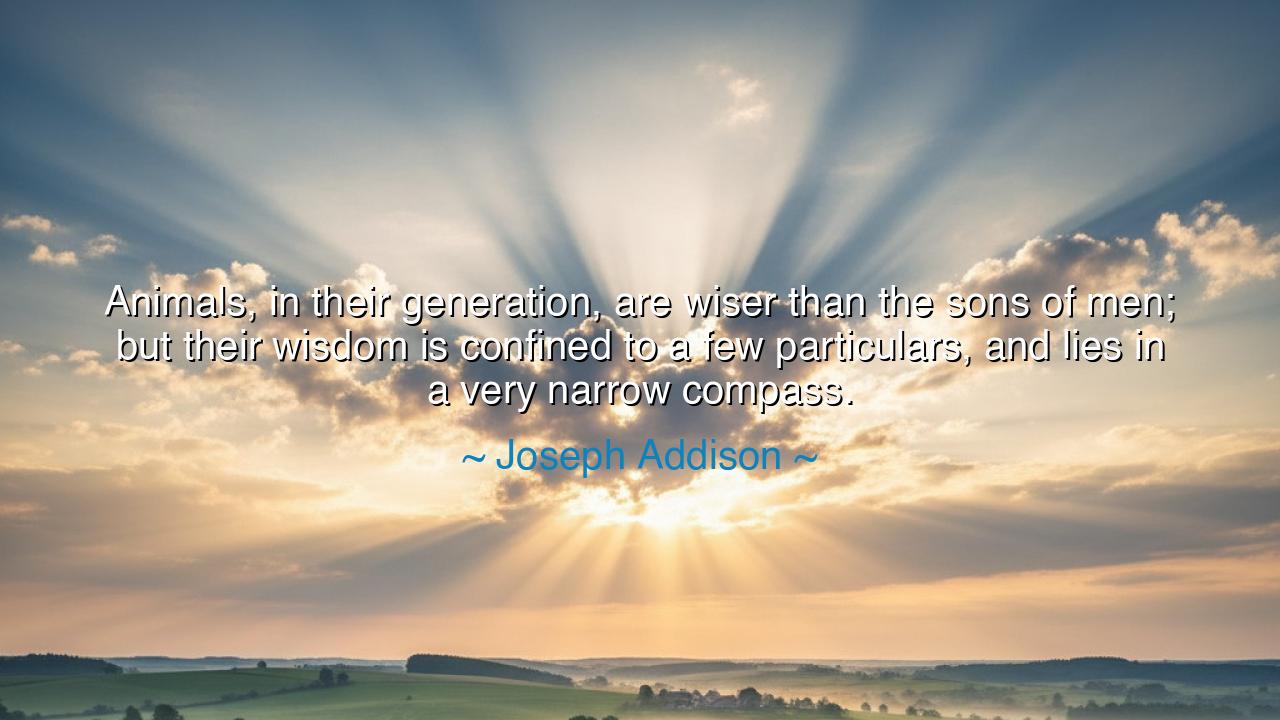
Animals, in their generation, are wiser than the sons of men;
Animals, in their generation, are wiser than the sons of men; but their wisdom is confined to a few particulars, and lies in a very narrow compass.






Joseph Addison, essayist of the Enlightenment and keen observer of nature, declared: “Animals, in their generation, are wiser than the sons of men; but their wisdom is confined to a few particulars, and lies in a very narrow compass.” In this teaching he unveils a paradox: that the beasts, though lacking reason, often act with greater surety and order than mankind. The bird builds its nest without schooling, the bee shapes its hive without debate, the ant labors without command. Their wisdom is instinctive, certain, and unerring—yet it is bounded, narrow, limited to survival.
The sons of men, by contrast, are free. They may stumble where animals succeed, for man forgets simplicity and strays into pride. Yet this very freedom, this capacity for error, is also the gateway to greatness. For though beasts are sure in the ways of their kind, only man can ponder justice, beauty, eternity. Thus Addison’s words are not to diminish mankind, but to humble him, reminding him that even the lowliest sparrow may seem wiser in its certainty than kings in their folly.
History bears witness to this truth. Consider the Tower of Babel, when men, swollen with pride, sought to climb into heaven itself. In their confusion they lost even the simple harmony that the stork or swallow keeps in migration. Their wisdom, though vast in ambition, was undone by arrogance. Yet in the same world, the migrating geese traced their path with perfect order, and the honeybee still returned to its hive without faltering. Here we see Addison’s insight: animals are wiser in the narrow, but man’s folly in the wide can make him seem less wise than they.
Yet humanity’s gift lies precisely in that wide compass. A lion knows how to hunt, but he cannot ask why. A swallow knows when to fly, but she cannot wonder at the stars. Man, though stumbling, though often less certain than the beasts, has been granted a mind that reaches beyond instinct, toward art, faith, and eternal truth. If his errors are greater, so too are his possibilities.
O children of tomorrow, take heed of this wisdom. Learn from the animals their diligence, their constancy, their harmony with nature. Yet do not confine yourselves to their narrow compass. Use your freedom not for pride, but for pursuit of the higher good. Remember Addison’s teaching: the beasts may seem wiser in their instinct, but man is called to a greater wisdom still—the wisdom to unite reason with humility, freedom with reverence, and thus rise above both beast and folly.






NUNguyen Thi Nha Uyen
This quote provokes me to think about the definition of wisdom itself. Is wisdom about breadth of understanding or depth of skill? Animals appear to excel in depth within their particular needs, while humans attempt to grasp everything, often imperfectly. Could this comparison inspire a reevaluation of education, training, or personal development to balance specialization with general knowledge? I’d also like to explore whether human creativity could ever replicate the instinctive efficiency seen in animals.
TLNguyen Thi Truc Linh
I feel both admiration and envy toward animals after reading this. Their wisdom, though limited, seems flawless within its scope. Does this suggest that specialization and instinctive understanding are forms of intelligence humans struggle to achieve? I also wonder if humans could benefit from embracing simplicity and focus rather than attempting to master every conceivable domain. How do we reconcile our broad knowledge with the risk of being shallow in its application?
TNTram Nguyen
This thought makes me reflect on the limitations of human knowledge. Are we perhaps too proud of our intellectual achievements while ignoring the precision and adaptability found in the animal world? I’m curious whether our complex societies dilute natural instincts that once guided human survival. Could studying animals more closely help us understand not just biology, but ways to refine our own decision-making and focus in daily life?
THTongLau Hello
I find this statement both humbling and reflective. Does it imply that animals, in their simplicity, are closer to perfection within their limited domain than humans are in the complexity of ours? It raises questions about efficiency versus versatility. Could focusing on fewer, essential skills make humans wiser in practical terms? I also wonder if our broader curiosity and capacity for abstract thought ultimately compensate for our narrower practical wisdom.
HDhao dinh
Reading this, I feel intrigued by the idea that wisdom can be both broad and narrow. Could it be that animals excel in specialized knowledge because they rely on instinct and experience, while humans scatter their attention across many pursuits? I also question whether humans might regain some of that ‘narrow compass’ wisdom by simplifying our lives or reconnecting with nature. How much of our intelligence is diluted by overthinking and distraction?